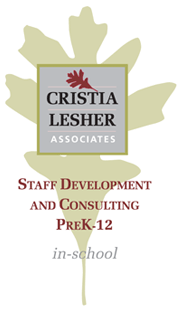Responding to Tier 2 Behaviors
Available as a Workshop and/or Consulting by Polly Bath
How teachers and administrators can work together to create a culture that accepts and is committed to responding to higher level behaviors
 As our students continue to demonstrate actions that make our eyes widen and our stomachs turn, we become discouraged, defeated, and less able to get to the business of teaching and ‘administrating.’ BUT, what if we developed a professional culture in our schools that accepted and actually expected these higher level behaviors, just as we have always accepted and expected academic challenges?
As our students continue to demonstrate actions that make our eyes widen and our stomachs turn, we become discouraged, defeated, and less able to get to the business of teaching and ‘administrating.’ BUT, what if we developed a professional culture in our schools that accepted and actually expected these higher level behaviors, just as we have always accepted and expected academic challenges?
This workshop is for teachers, administrators, and all educators interested in working together to address Tier 2 behaviors – most especially those behaviors that feel beyond what we can manage in a typical day and that we cannot teach around.
We will look at how your school can:
- Decide, with consistency, what Tier 2 behaviors are for your school;
- Identify the changes in Tier 1 behavior supports that would dramatically reduce Tier 2 behaviors;
- Address serious causal factors behind some behaviors, such as trauma, lack of social skills, overwhelming environmental stressors;
- Identify Tier 2 behaviors best handled in the classroom by the teacher and paraprofessional, and how they can be handled effectively in that setting;
- Identify Tier 2 behaviors best handled by an administrator, and ways to handle them effectively;
Identify what the administration can do to respond and support the classroom teacher who is handling Tier 2 behaviors; - Establish logical/restorative consequences that hold students accountable for their behavior;
Develop a Student Support Center as a Tier 2 intervention for when a student should not remain in the classroom; - Use behavioral data to determine the effectiveness of interventions;
- Evaluate whether rewards and incentives are working or not, and only use those that prove effective;
- Alleviate the often strained relationships with parents/caregivers of children who are struggling;
- Create a culture of support for one another, without judgement, that allows everyone to pull together, persevere, and be resilient when facing daily behavior challenges.
Audience: General and special education teachers, school and district administrators, guidance counselors, school social workers, school adjustment counselors, school psychologists, paraprofessionals, PreK-12.

